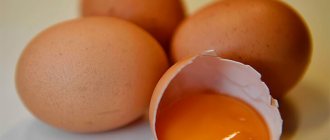You buy a dozen eggs in the supermarket, open the box - and they look... so to speak, as “ECO” as possible. It is better not to think at all about the origin of the stains remaining on the shell. A familiar situation, isn't it? Every time you have to carefully o. But the older generation never tires of repeating that washed eggs cannot be stored in the refrigerator - they say they will quickly spoil. Is it true? Partly yes.
At poultry farms, thorough cleaning is not organized precisely because it shortens the shelf life. But washing under the tap does not turn a fresh egg into a rotten one: it will take a long time before it becomes unfit for food.
Washing eggs before storage
What are the reasons that most people choose to wash eggs before storing?
Some people, out of habit, wash all food before putting it in the refrigerator. But the most important reason is the fear of contracting salmonellosis. In this case, you need to understand that the infection comes from the chickens themselves, and not from the laid eggs. If birds are not kept properly, salmonellosis can spread extremely quickly. As for the egg, bacteria are found only on the shell. It is especially dangerous when there are remains of droppings on it. Important!
Chicken eggs cannot be washed. Otherwise, the protective film covering the shell is removed. This causes the product to deteriorate faster. Therefore, store washed specimens for no more than 5 days, and store untreated ones for 30 days. The difference is quite noticeable.
Do I need to wash store-bought eggs? If there are any remaining droppings on them, carefully wipe them off with a dry cloth. And just before use, wash in hot water and soap.
To protect yourself from pathogenic bacteria, adhere to the following rules:
- Buy whole eggs without damage to the shell. Even if a small crack is visible on the product, infection can penetrate through it. Then the risk of contracting salmonellosis increases.
- After cooking, immediately throw away the shells, and wash all used items in hot soapy water, rinse and wipe with vinegar.
- Store eggs in a separate container with a lid, away from contact with other products.
- Prefer products from small poultry farms. Chicken care from such producers is much better than from large enterprises.
Useful tips
Any farmer can encounter dirt on the eggs that his chickens produce. In such situations, the task of the poultry farmer becomes to maintain the cleanliness of the chicken coop.
It is not hard. The main thing is to monitor the condition of the nests, drinking bowls with feeders, and bedding. Private owners often add straw to maintain cleanliness. Straws are hollow inside, which encourages mold growth. Mixing with food residues creates a favorable environment for the occurrence of infection and parasites.
Therefore, it is better to replace straw with sand. It will be easier to sift out the remains of feathers, droppings, and various debris using a sieve, and pour the clean sand back. In addition, it will help chickens get rid of annoying parasites by arranging baths to clean their feathers.
We suggest you read: How to clean a burnt stainless steel pan
A good, but not cheap option is a special bedding layer. Its properties and benefits are described in the article “Litter with bacteria for a chicken coop.”
Regular disinfection of the poultry house is mandatory. Read the article “Methods for disinfecting a chicken coop at home” for important recommendations.
It is necessary to pay attention to the health of chickens. Regular monitoring will help separate the sick from the healthy so as not to risk the quality of the eggs.
Having bought a tray of eggs in a supermarket or market, it is important not to neglect the recommendations that can protect your health and save time and nerves:
- You should not purchase large quantities from private farmers. And when purchasing in these places, it is recommended to ask the sellers for a veterinary opinion - a guarantor of product quality.
- The shell must be intact. Defects allow microbes to enter.
- Bacteria from the shell can contaminate neighboring products. Sealed trays and containers with lids will help solve this problem.
- Objects that have come into contact with the shell should be thoroughly washed with a weak solution of vinegar.
- It is necessary to approach cleanliness wisely. Eggs do not need to be soaked for 2-3 hours and then rubbed for a long time to be sure of their cleanliness.
- To prepare a tasty, safe dish, it is not necessary to wash eggs with aggressive detergents. It is enough to rinse them with hot water and immediately break the shell.
Dear readers, if you found the article useful, please rate it 5 stars. In the comments you can share your opinion about what you read, your own notes, and discuss the topic. Reposting will help spread important information.
Methods for storing chicken eggs
There are usually no difficulties with storing chicken products. You can store it both in the refrigerator and at room temperature, making some manipulations.
Cold storage
If you store the product in the refrigerator door, then this is wrong. The air temperature on the side shelves is 4-5 degrees higher than in the entire refrigerator. And constantly closing and opening the door does not have the best effect on the eggs. Therefore, it is best to store eggs on the lower shelves closer to the back wall. This place is considered the coolest.
It's better if you place them pointy end down inside the tray. This is necessary for longer freshness of the product, since at the blunt end there is a small accumulation of air between the shell and the protein. The second reason is the possibility of accumulation of pathogenic bacteria inside the airspace. While at the bottom, they will gradually rise to the top, thereby hitting the squirrels.
Important! The optimal storage temperature is 4 degrees above zero. This way the product will stay fresh for up to 5 weeks.
If you are interested in how long boiled eggs can be stored, then their maximum period is up to a week. Provided that the shell is intact. In purified form – no more than 2 days. The location in the refrigerator does not matter.
How to choose condensed milk
Condensed milk is a viscous, sweet, aromatic pleasure that comes from childhood. After all, cakes and pastries were made from it...
Storing eggs at room temperature
There are 2 more common methods:
- The product is wrapped in a paper napkin, 1 piece at a time. In this case, the shell will not absorb excess moisture and unpleasant odors. The napkin can be replaced with baking paper or newspaper. The shelf life will be up to 7-10 days. Provided the room is cool. Therefore, this method is not suitable during the hot season.
- Prepare a solution from 1 liter of water and 25 g of salt. Dip the eggs into it and put it in a dark place. In this way, you can preserve the egg for up to 26-28 days.
From all of the above, we can conclude that the best place to store eggs is the refrigerator.
Determining product freshness
On store-bought eggs, you can look at the production date and determine the approximate shelf life. But sometimes stale eggs are sold at the market, so if you still like homemade eggs, take them from a trusted person.
How to quickly determine the degree of freshness of a product? Simply dip the egg in a container of salted water:
- fresh - it will lie on the bottom sideways;
- 7-day – located at an angle of 45 degrees;
- 2-3 weeks - will stand upright, end down.
Important! If it surfaces, then under no circumstances eat such an egg. Discard it carefully without breaking it.
You can check freshness by shaking. If the egg is of high quality, there will be no sounds. If there is squelching, the product is spoiled. Do not eat specimens with cloudy protein.
Dangers
A chicken coop is not the cleanest place. There is a lot of dirt, bird waste and, most dangerously, pathogenic bacteria. It would seem, how can pathogenic microorganisms get into an egg? It's simple: through the shell. Microcracks appear on the shell, which cannot be seen without special optical instruments. It is through such damage that bacteria that are dangerous to the human body enter inside. Eating a contaminated egg may cause negative consequences such as food poisoning, diarrhea, vomiting, nausea, etc. To protect yourself from such health problems, it is enough to follow simple rules for collecting and storing domestic eggs.
Storing eggs depending on their type
Quail products can remain fresh even at higher temperatures. Therefore, they can be placed in the refrigerator door. Even if quail eggs are placed at room temperature, the shelf life will be up to 30 days. And from 0 to -5 degrees can be stored for 2 months.
Homemade chicken eggs are initially sterile, provided they come from a healthy bird. After 2 hours, they gradually absorb various bacteria. Therefore, keep the chicken coop clean. It is ideal to store the homemade product for 5 days after laying. But at the same time it must ripen, and after 2 days the yolk becomes more pleasant to the taste. As for storage, place them in the refrigerator according to all the rules.
Condensed milk caramel
Today we will learn how to make caramel from condensed milk using one very simple method. For cooking we don’t…
The bottom line is: eggs should not be washed before storing. But at the same time, it is necessary to follow all the rules of selection and purchase. And before use, treat with soap and hot water. The health of the whole family will depend on these actions.
Is it possible?
Despite all the dangers and the desire to keep food clean in the refrigerator, you still cannot wash eggs. The fact is that this removes an important protective layer from them, which helps them to be stored for as long as possible. And the difference is quite big: if unwashed eggs can be kept in the refrigerator for a month or even more, then if you wash them, the period is literally reduced to 4-5 days.
But it cannot be said that the product that laying hens give to people should be dirty all the time. Before use, it is not only possible, but even necessary to wash it, in order to avoid infection with salmonellosis.
How to Store Eggs at Room Temperature
You can store eggs without a refrigerator in any cool room. Of course, in this case, wash eggs before storing . What do we have to do? Wrap each egg in paper or newspaper and place it in the basket, pointy tip down.
Eggs should be stored in plastic, cardboard containers or a basket. Eggs can be kept in the same container in which they were purchased.
To increase the shelf life of eggs, use folk remedies:
- Rub each of them with petroleum jelly, glycerin or vegetable oil.
- Soak for a few seconds in melted paraffin.
- Spread the eggs with egg white or lard.
- Make a solution of salicylic acid - 15 g of powder per 1 liter of water. Keep the eggs in this solution for half an hour. After this procedure, the eggs should dry. You can't wipe them off.
- Soak the eggs for a few seconds in a strong solution of potassium permanganate.
- Soak the eggs in sweet syrup. The syrup should be prepared as follows: for 1 liter of water, 1 kg of sugar.
Collection
Chicken eggs are usually collected twice a day.
The first time occurs in the morning, while the birds are feeding, and the second time in the afternoon. This allows the livestock owner to reduce the risk of egg pecking and excessive shell contamination.
It is best to collect eggs with clean hands so that no microorganisms can settle in its contents ahead of time.
To reduce the risk of infection, the eggs are handled with only two fingers at the blunt and sharp end. If the egg is taken with the whole hand, the thin shell that protects the egg from microorganisms will be erased, which will increase the chance of bacterial penetration.
Are boiled ones safer?
When cracked, there is a risk of bacteria entering the egg. Washing with soap alone will not help here. Cracked eggs can only be protected by boiling. From the moment they boil, they need to be cooked for 15 minutes.
Cracked eggs can only be protected by boiling.
When frying, the temperature must exceed +65 °C. When cooking eggs in a bag, they are fried on both sides, covered with a lid to ensure complete heating.
Interesting option
It is possible to extend the shelf life of washed eggs if you freeze them. Can be raw and whole, right in the shell. Or boiled, peeled.
Raw whites and yolks are frozen separately. The protein is simply poured into a tray or bag. It indicates the quantity and freezing date. The yolks are pre-beaten. For storage, they can be poured, for example, into ice molds. For ease of further use, add salt or sugar.
The article “At what temperature does a chicken egg freeze” will help you become familiar with its shelf life in this form. And also about the nuances of proper freezing and defrosting.











